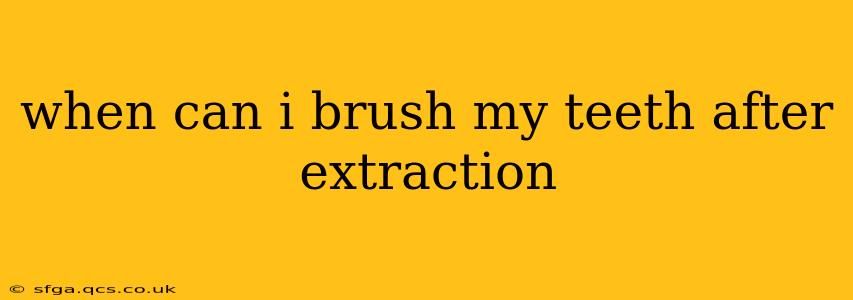Tooth extraction, while a common procedure, leaves your mouth vulnerable. Knowing when and how to brush your teeth afterward is crucial for preventing infection and promoting proper healing. This guide provides a clear timeline and essential advice to ensure a smooth recovery.
How Soon Can I Brush After a Tooth Extraction?
The short answer is wait at least 24 hours. This allows the blood clot to form properly at the extraction site. This clot is essential for healing and preventing a painful and potentially serious complication called "dry socket." Brushing too soon can dislodge this clot, leading to significant discomfort and increased healing time.
What Happens If I Brush Too Soon After an Extraction?
Brushing too aggressively or too soon after an extraction can disrupt the blood clot forming in the socket. This can result in:
- Dry Socket (Alveolar Osteitis): This is a painful condition where the protective blood clot is dislodged, exposing the underlying bone and nerve endings. It's characterized by intense pain, a bad taste in the mouth, and sometimes a visible empty socket. Dry socket requires professional treatment.
- Infection: A disrupted blood clot increases the risk of infection, potentially leading to complications requiring antibiotics or further procedures.
- Delayed Healing: Interfering with the healing process can prolong recovery time and increase discomfort.
How Should I Brush My Teeth After 24 Hours?
Once the 24-hour mark passes, you can resume brushing, but with some important modifications:
- Gentle Brushing: Use a soft-bristled toothbrush and brush gently around the extraction site. Avoid direct contact with the socket itself for several days.
- Focus on Other Areas: Concentrate your brushing efforts on the rest of your teeth and gums. Good oral hygiene is crucial for preventing infection, even if you're dealing with an extraction.
- Rinse Gently: After brushing, rinse your mouth gently with salt water (1/2 teaspoon of salt dissolved in 8 ounces of warm water). This helps to clean the area without disturbing the clot. Avoid vigorous rinsing or spitting.
- Avoid the Area: For the first few days, avoid brushing directly on the extraction site. As the healing progresses, you can gradually resume normal brushing techniques in the area.
What About Using Mouthwash After Extraction?
Similar to brushing, it's best to avoid using mouthwash for at least 24 hours after the extraction. Some mouthwashes contain alcohol or other ingredients that can irritate the extraction site or damage the blood clot. After 24 hours, you can use a gentle, alcohol-free mouthwash. Always check with your dentist or oral surgeon for recommendations.
When Can I Eat Normally After a Tooth Extraction?
This depends on the complexity of the extraction and your individual healing process. Initially, stick to soft foods that don't require excessive chewing. Gradually reintroduce firmer foods as the healing progresses. Your dentist or oral surgeon will provide specific dietary guidelines based on your situation.
When Should I See My Dentist or Oral Surgeon After a Tooth Extraction?
Contact your dentist or oral surgeon immediately if you experience:
- Severe pain: Pain that's not relieved by over-the-counter pain medication.
- Excessive bleeding: Bleeding that doesn't stop after applying consistent pressure for 30 minutes.
- Signs of infection: Fever, swelling, increased pain, or pus.
- Dry Socket: Intense pain, bad taste, or a visible empty socket.
Following these guidelines will help ensure a comfortable and efficient recovery after your tooth extraction. Remember, every individual heals differently, so always follow your dentist or oral surgeon's specific instructions for best results.
